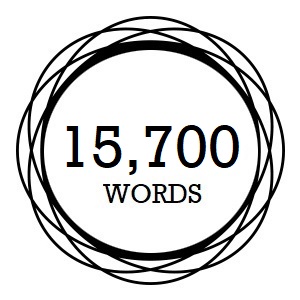15,700
 Last week, four writer-friends (Ryan O’Neill, Kim Lock, Laurie Steed, and A.S. Patric) talked about insecurities in writing. Given the Twitter response and the retweeting that followed, their answers resonated with many other writers out there. A big thank you again to my four friends
Last week, four writer-friends (Ryan O’Neill, Kim Lock, Laurie Steed, and A.S. Patric) talked about insecurities in writing. Given the Twitter response and the retweeting that followed, their answers resonated with many other writers out there. A big thank you again to my four friends
for sharing.
Now it’s my turn. These are my insecurities when it comes to writing:
- That the writing is no good. I can revise exhaustively, and still not be assured, because here’s another truth: You know what you know.
- That the words will stop coming. Back in 2007, I intended to adapt three screenplays I’d written into novels. I did the first, only adapted the second as a novella last year, and the third sits unwritten because I had ideas for eight other books, one novella, and two screenplays whose ideas demanded they were written first. I have ideas. I have lots of them scribbled down. So I’m (fairly) confident I’ll always have ideas.
Back in 2006, I went off an antidepressant – Aropax – and suffered hideous side-effects as part of the withdrawal. One of the side-effects was to draw a blank on what word came next. It didn’t even have to be a difficult word. I don’t know how much this side-effect has grown; or if, as I’ve learned more, I’ve put more pressure on myself to produce, thus unwittingly asphyxiating myself; or I now suffer from a combination of both.
But what if words don’t come? What if I’m in mid sentence—
Just like that, nothing more. - That nobody will like what I write. A writer-friend was lamenting their struggle to get published. I informed them that once they were published, a train of new insecurities began.
Obviously, the interpretation of any artform is subjective, but there’s still a tipping point either way that indicates if something is generally good or generally bad.
If the rating is out of 5, then anything below 2.5 is below average. Anything above is above average. I doubt many writers with an average rating of 2 for their book, for example, would feel assured their story is good and memorable because a handful of people like it when the evidence overwhelmingly suggests there’s something not quite working there. (Bizarrely, I do think some bad books get lauded and flattered in ratings.)
A book is sent out into the world and largely has to fend for itself. There’s always the concern it just won’t be good enough to even be remembered as above average. And then, what if it’s worse? What if it’s mediocre? Or terrible?
Or just shit? - That I’ll realise I should’ve done things differently. As an editor, I’m worried about picking up any book I’ve edited just in case I find something I could’ve done differently. At the worst, I can assure myself that the author is happy with it, even if I become discontented.
- That what I write won’t make sense, or the sentence I begin now will have no (or little) realisation. Last week, I said I’d get into my own insecurities after the answers from my writer-friends. I never did (not that I think anybody noticed). Sometimes, I see stuff like that when I revise. I would’ve begun something, and am either building to or foreshadowing a point, and it never comes. Or a sentence begins about something, and becomes about something entirely unconnected.
How often do I miss those things? As an author, subconsciously I’m filling in the gaps without ever realising them on the damn page. Or I think I understand why something has evolved the way it has.
An editor should pick it up, but the piece has to get that far first – and that’s provided they’re not put off by the unexplored threads or the disjointed passages.
When I was younger, stupider, and naïve(r), I had an unfailing confidence in my writing. But as I grew older and more experienced, I started to learn what could be wrong. When I worked as an editor specialising in structural editing, I really learned what could be wrong. There’s so much stuff out there I don’t know about, how do I know that’s not thriving – beyond my abilities to detect – in my writing?
The pattern I’ve found is that inexperienced writers are confident, because they simply don’t know what could be wrong. Experienced writers are insecure because they do know what could be wrong.
I don’t have that failsafe with my own work. I’m scared I’ll find an error, terrified I’ll discover something I could’ve phrased differently, and petrified I’ll unearth an idea I could’ve explored better. Or, maybe, just maybe, something entirely new will occur to me that should’ve been included and would’ve elevated the work.
I’m astonished that we have a stream of movies that are rereleased as director’s cuts when they hit DVD and BluRay, but we don’t get more author’s cuts of books where the author feels they can now do it better, or they can address issues they had during the original writing and/or editing of the book. Only two come to mind: Stephen King rereleased The Stand in 1990 with about four-hundred pages (roughly 150,000 words) restored. And Raymond Carver’s What We Talk About When We Talk About Love, which was republished as Beginners. (Carver complained about being heavily edited and, at times, rewritten, by his editor Gordon Lish.)
Some may be surprised that there’s no fear of rejection, but that’s part of the writing life. If you’re going to write, you’re going to be rejected. That’s just reality.
I can live with rejection.